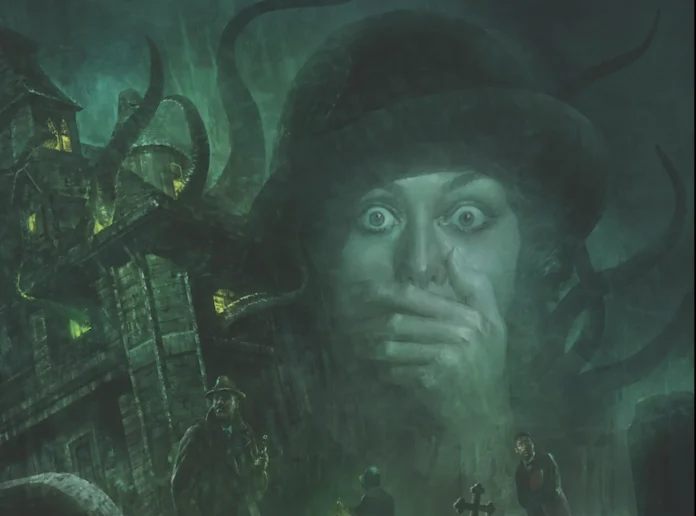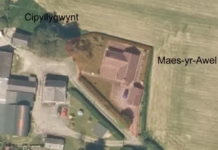Call of Cthulhu is a well-established, prominent RPG that, in some parts of the world, has left the titan that is Dungeons & Dragons staggering in the dust. But how best do you convince people to try out a new system when they’re happy with what they’re playing? Admittedly this is less of a problem in this day and age, particularly in a post-COVID era which I think went a long way to making people feel just how many hours there are in a day when you’re stuck in one place, relatively isolated.
Some people, however, don’t want to make the investment, or aren’t prepared to invest the mental energy into learning a whole new system (which is entirely valid).
Enter the idea of the Starter Set, which is typically a pared back, simplified, or stripped down version of a game’s rules to whet the appetite of prospective players.
Chaosium, as part of the 40th anniversary of Call of Cthulhu in 2018, updated the Call of Cthulhu Starter Set.
And by any standard, it was a resounding success. Which is really what compelled me to write this review; since the update of the Starter Set, slowly at first but with greater volume as the years have passed, I’ve had friends and acquaintances become curious about it, in a way they weren’t curious with the Call of Cthulhu core rulebook already existing. Perhaps some masterful advertising on Chaosium’s part? Either that or the incessant focus of my interests has bled over to friends and acquaintances.
Structurally, the Call of Cthulhu Starter Set is divided into three books; Book 1 is a solo scenario, Alone Against the Flame; Book 2 covers the introductory rules for the system; Book 3 is a collection of classic, Jazz Age Call of Cthulhu scenarios for aspiring Keepers to try out. Well, technically there’s a 4th book, but that contains various handouts for the scenarios in Book 3, so I’m not really counting it.
I’ve long held that the best way to learn a system is by making a character and playing a bit of it, but that isn’t always feasible, and sometimes is putting the cart before the horse. Which is why I can only praise Chaosium for opening with a solo scenario, a clever way to circumvent the need for having a group on board to try out a system from the outset. For the uninitiated, a solo scenario is playable with just one person, with a structure quite similar to a choose your own adventure novel, like Steve Jackson’s Fighting Fantasy books, utilising the basics of the Call of Cthulhu system to interact with those choices.
This is written from the perspective that the reader will not only be unfamiliar with Call of Cthulhu, but largely unfamiliar with tabletop roleplaying games in general, so serves as an excellent entry point for anyone at any level of awareness. I’ll refrain from commenting on the scenario itself, as there would be spoilers, and that isn’t really the focus here.
Book 2, the introductory rules, provides functional rules to run Call of Cthulhu in less than 30 pages. It begins with a basic primer about the setting, HP Lovecraft, cosmic horror, the Cthulhu Mythos, all the core, underlying pillars of the system. Next comes rules for creating Investigators (player characters in Call of Cthulhu), in a more simplified (albeit limited) form present in the core rulebook, but they’re quite sufficient to play, and anecdotally I’ve even heard some people comment that they prefer them, as there’s less randomization involved. Your mileage, of course, may vary.
Next comes a breakdown of the system’s mechanical precepts, the d100 resolution method, Difficulty Levels, and types of success: Call of Cthulhu works on a system of percentile dice roll under, with lower values being better. In short, rolling below your skill number down to half its value (for example, if your character had a Climb of 70% and rolled between 35% to 70%), that would be a Regular Success. If they rolled between half the skill’s value and one fifth its value (14% to 35% using the earlier example), that’s a Hard Success. Rolling below the one fifth value is an Extreme Success. The more difficult the task, the higher level of success might be required to achieve the character’s desired outcome. Extreme beats Hard beats Regular, which is how Opposed checks are resolved as well. In this way, higher skill values also produce larger ranges for better levels of success.
Call of Cthulhu also employs a system of Bonus and Penalty Dice rather than flat plus or minus modifiers to rolls, representing advantageous or poor circumstances respectively. A Bonus or Penalty Die is an additional d10 in a skill roll, which affects the outcome; a Bonus die replaces the tens die of your roll if it would lead to a better outcome for you, and a Penalty Die works on the opposite principle. Bonus and Penalty Dice directly cancel each other out, and are capped at two of either type no matter the circumstances surrounding a role.
It’s a functional, comprehensible system that doesn’t get too bogged down in caveats and addenda, which I find generally enables quick enough play at the table, even when inducting new players into the system. Though whether it edges just too much on the side of complexity is, again, a matter of varying mileage. For my own money, I’ve come to prefer the blackjack method used by Mothership and Delta Green in recent years, but some don’t care for it being a swingier resolution mechanic, which is an entirely valid criticism.
There’s a small section on Luck, and Luck rolls, which a Keeper will generally call for when an outcome is largely down to random chance; in short, each character has a Luck score determined at character creation, and generally the character with the lowest Luck will be the one to roll for an outcome.
There’s a section on the Sanity mechanics that are what made Call of Cthulhu distinct during its inception, with Mythos encounters chipping away at a character’s mental stability over time. Easier to lose than it is to gain, Sanity is a ticking time bomb on a character’s longevity just as much as their physical health is.
Without going too much into the details, there’s a quite complete section on combat, involving the basics, how fighting back works, initiative, the use of firearms, and something I quite appreciated: a damage table of escalating severity listing typical examples that would inflict that kind of damage, such as d3 damage being done by a punch or kick, or 1d10 being inflicted by .38 caliber bullets. I’d make the argument that this is more functional than a massive list of weapons with their own listed damage type; I believe that’s a level of granularity that benefits no one.
These rules are certainly sufficient for the budding Keeper to try their hand at running the system, which brings us to Book 3.
Book 3 contains three classic scenarios: Paper Chase (which is specifically intended to be run by a Keeper with two players to ease them into things), Edge of Darkness, and Dead Man Stomp. Again, I won’t linger on any of the plot details found in these scenarios, which really should be reviewed individually. While I appreciate the inclusion of scenarios by level of escalating complexity, and that they offer a few different “feels” of scenario, I do find the lack of the prototypical Call of Cthulhu scenario, The Haunting, to be an odd choice.
Nevertheless, the Call of Cthulhu Starter Set is a slimmed down version of the core rulebook that’s good value for money at $9.99 on DriveThruRPG, and can be found here. Well recommended to anyone who’s curious about getting into horror role playing games.

| [donate]
| Help keep news FREE for our readersSupporting your local community newspaper/online news outlet is crucial now more than ever. If you believe in independent journalism,then consider making a valuable contribution by making a one-time or monthly donation. We operate in rural areas where providing unbiased news can be challenging. |

















